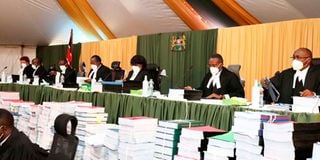BBI appeal ruling: Only 16 lawyers allowed in open court

Only 16 lawyers will be allowed in the makeshift tent courtroom on August 20, 2021 when the Court of Appeal delivers its judgement on the much-awaited decision of the on the legality of the BBI Bill.
The Court of Appeal’s much-awaited decision of the on the legality of the Constitution of Kenya Amendment Bill (2020) will be delivered in open court with a limited attendance of lawyers.
In a communication to parties, the appellate court’s Deputy Registrar Lorraine Ogombe said that due to Covid-19, only 16 lawyers will be allowed in the makeshift tent courtroom on August 20, 2021.
Other members of legal teams and members of the public will follow proceedings online.
The deputy registrar has directed each side, the appellants and respondents, to select and send names of the lawyers who will attend the delivery of the judgment in open court by close of business on Wednesday August 18, 2021.
The seven-judge appeals bench comprising justices Daniel Musinga, Hannah Okwengu, Patrick Kiage, Fatuma Sichale, Gatembu Kairu, Roselyne Nambuye and Francis Tuiyot will read the judgment inside a tent at the Chief Justice Gardens outside the Supreme Court.
Major constitutional moment
In the pending judgment, which has been described as a major constitutional moment, among the most contentious issues that the judges will be addressing is whether the country's 11-year-old Constitution has a basic structure.
The High Court had ruled that the Constitution has a basic structure which could only be amended through the “exercise of a primary constituent power of the people”.
Though the declaration of basic structure was widely understood to mean that certain sections of the Constitution are unamendable, the High Court ruled that amending the basic structure requires recreation of the conditions and a four-step procedure that were involved in founding the 2010 Constitution.
The steps include civic education, public participation, the convening of a Constituent Assembly and eventually a referendum.
Lawyer Waikwa Wanyoike says even if the Court of Appeal allows BBI appeal fully, it will be too little and too late and the fight is likely to escalate to the Supreme Court.
Election mood
"The 2022 election mood is quickly setting in and it will be politically suicidal for President Kenyatta and Raila to try and juggle unpopular constitutional amendments alongside election campaigns," says Mr Wanyoike.
"Let us not forget that BBI is far from being out of the woods yet. Even if the Court of Appeal allows the appeal entirely, there is still Supreme Court appeal waiting. In spite of their attempts to put on a brave face, Uhuru and Raila genuinely know that BBI is a lost cause,” argues the lawyer.
Another lawyer, Irungu Kang'ata, says if the court of appeal overturns the High Court decision, the bill will go into referendum under a cloud of suspicion, noting the High Court dented its image.
"The mood is moving towards elections. A decision that compels Kenya to conduct a referendum under Covid-19 situation inflames the public as against pro-BBI brigade led by Raila Odinga. Raila's prospects may not necessarily improve," says Dr Kang'ata, also the Senator of Murang'a County.
"Chances of Ruto leading a No vote and winning will be very high. This will give him the necessary impetus into 2022," argues Dr Kang'ata.
The appellate judges will be ruling on the appeals filed by President Uhuru Kenyatta, the Attorney-General, Raila Odinga and the Building Bridges Initiative (BBI) steering committee, lawyer Charles Kanjama and the Independent Electoral and Boundaries Commission (IEBC).
They challenged the judgment of a five-judge bench of the High Court which ruled that amending the Constitution through the BBI was unconstitutional, null and void.





